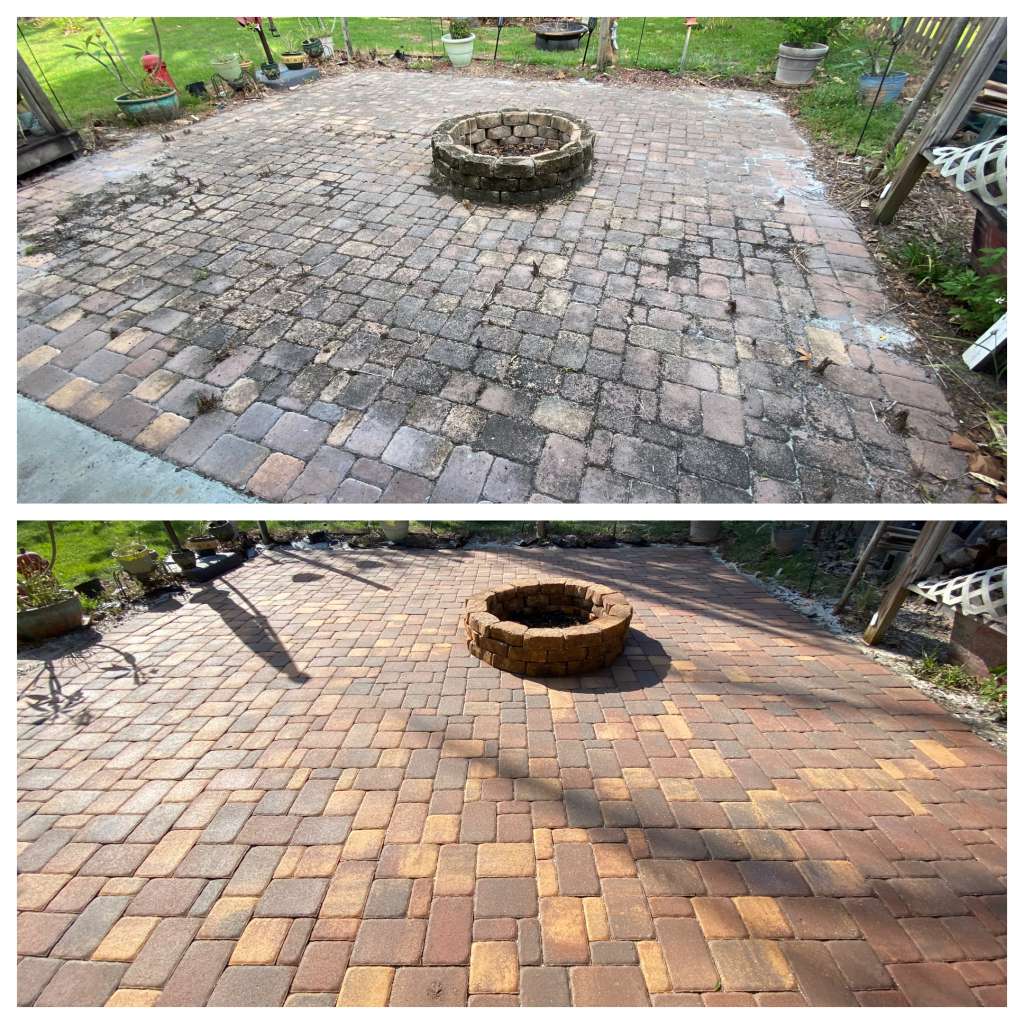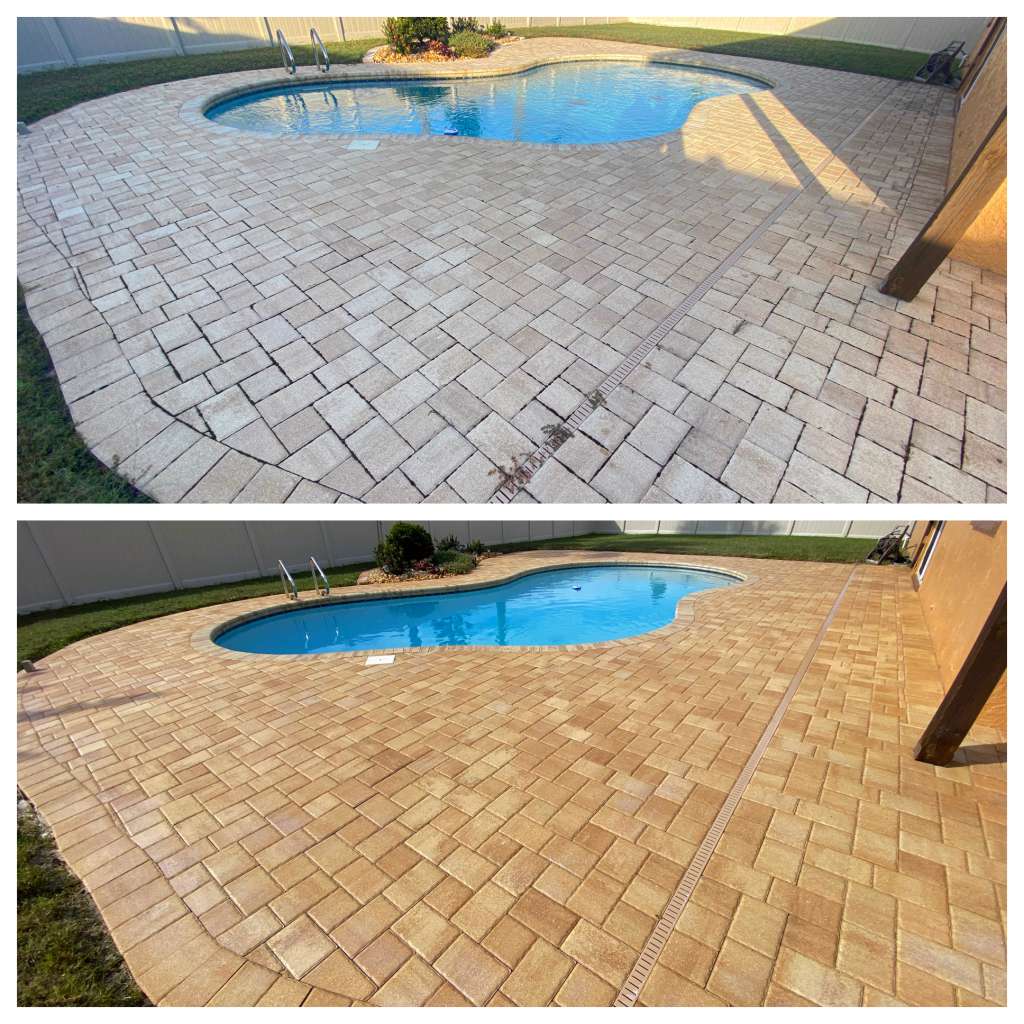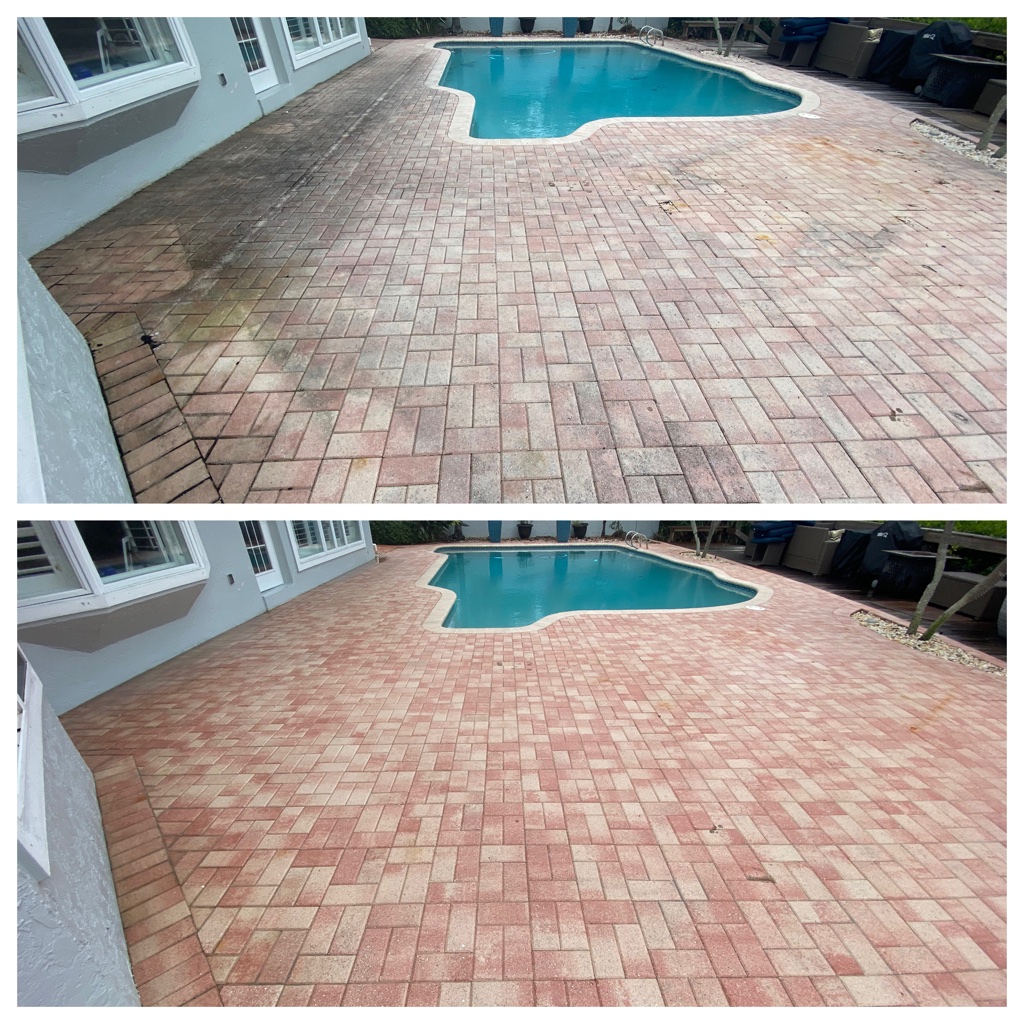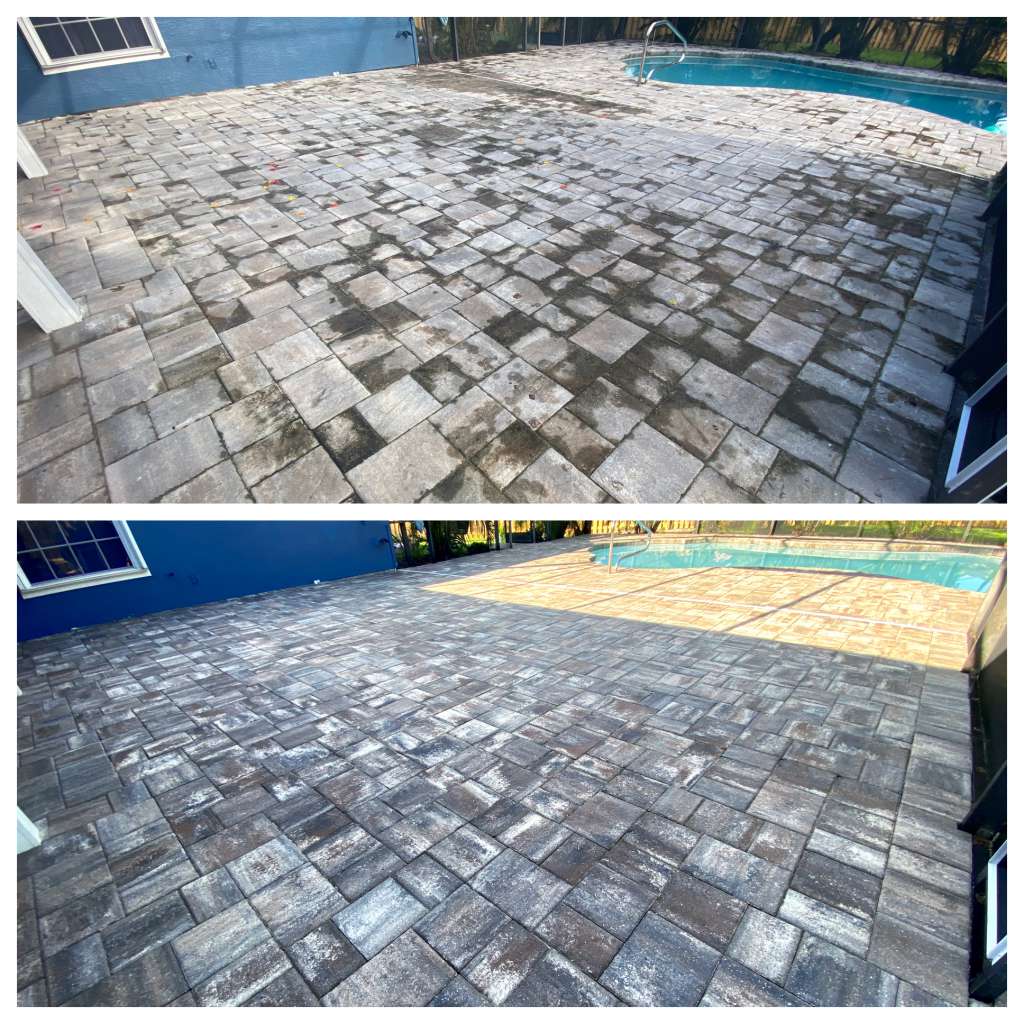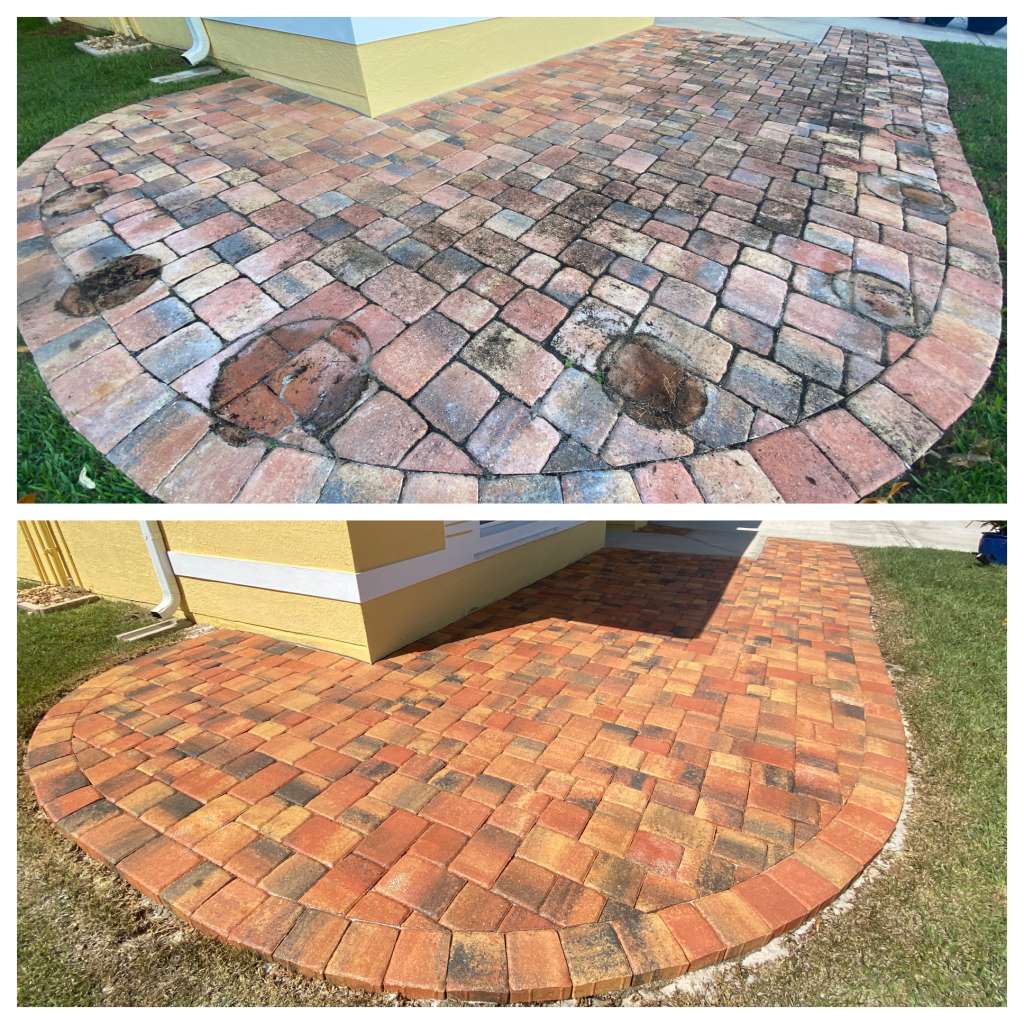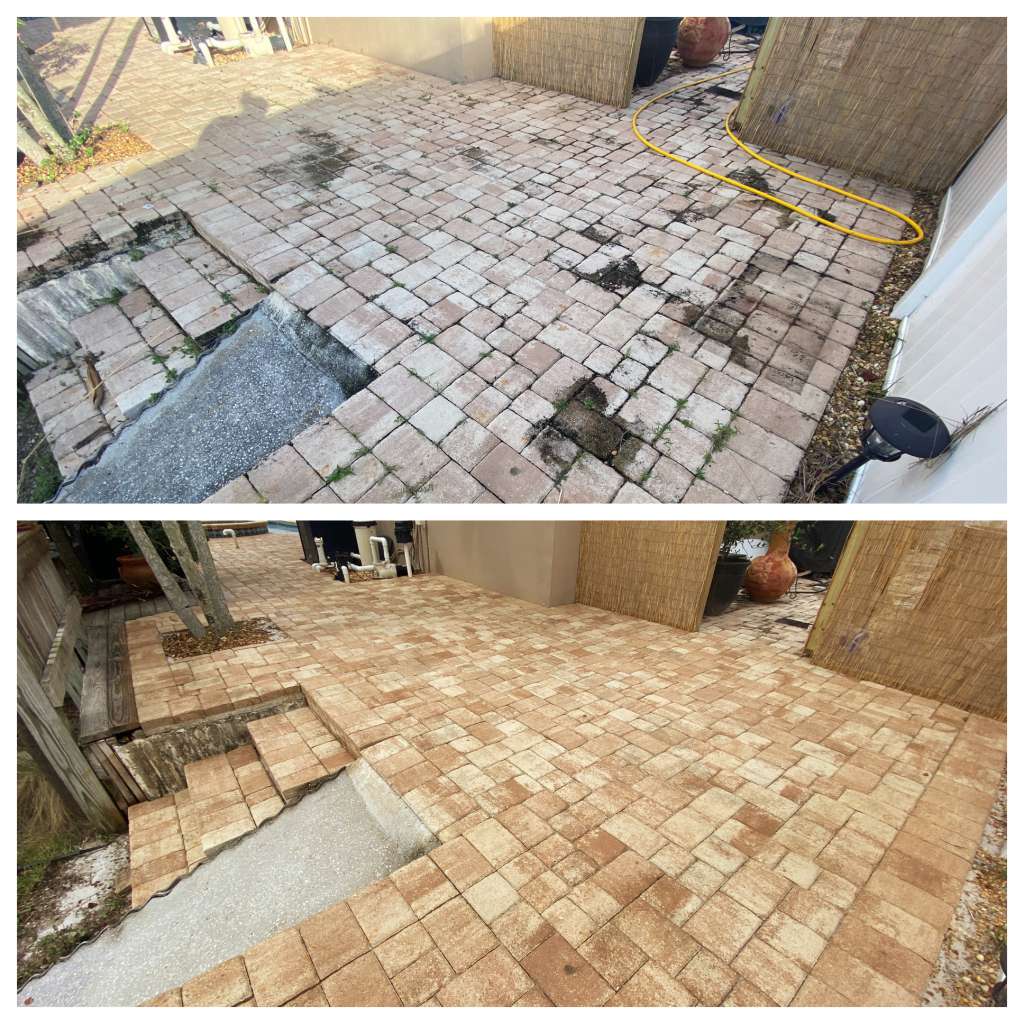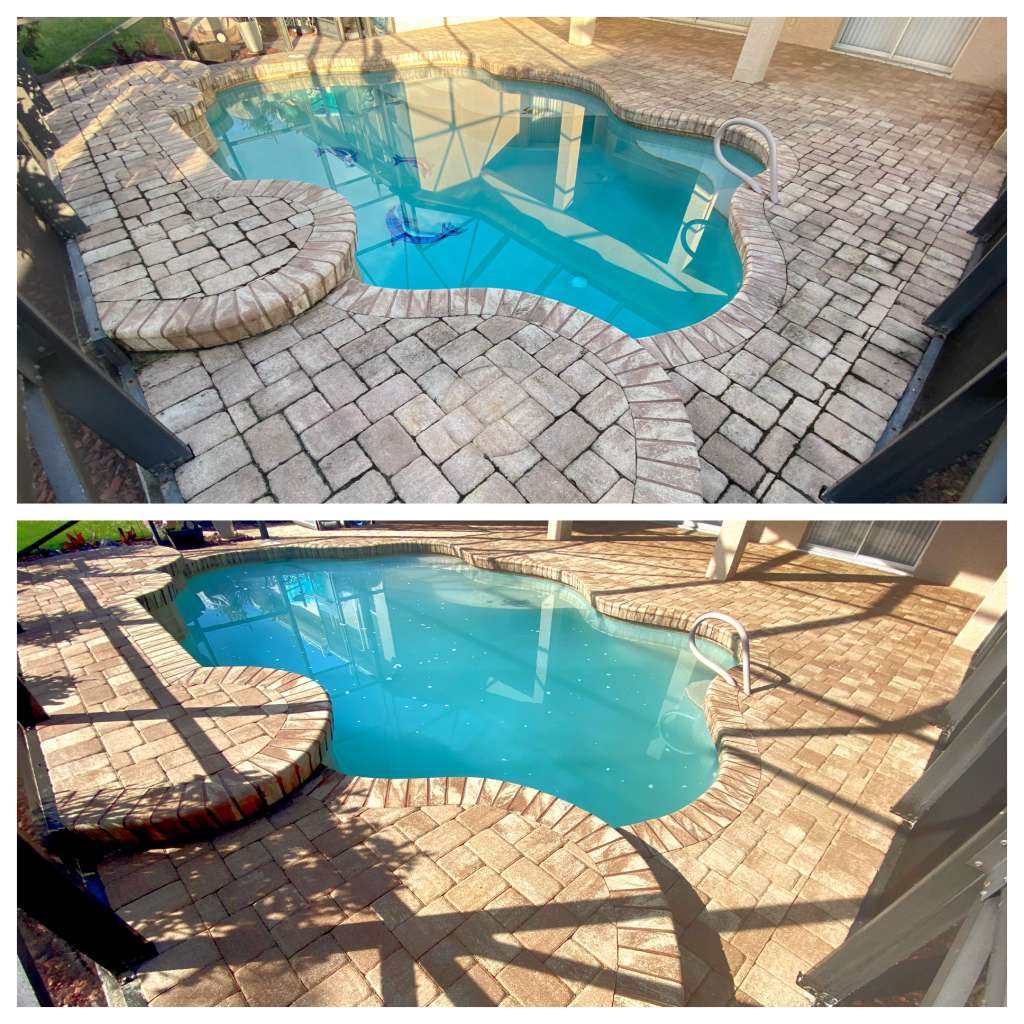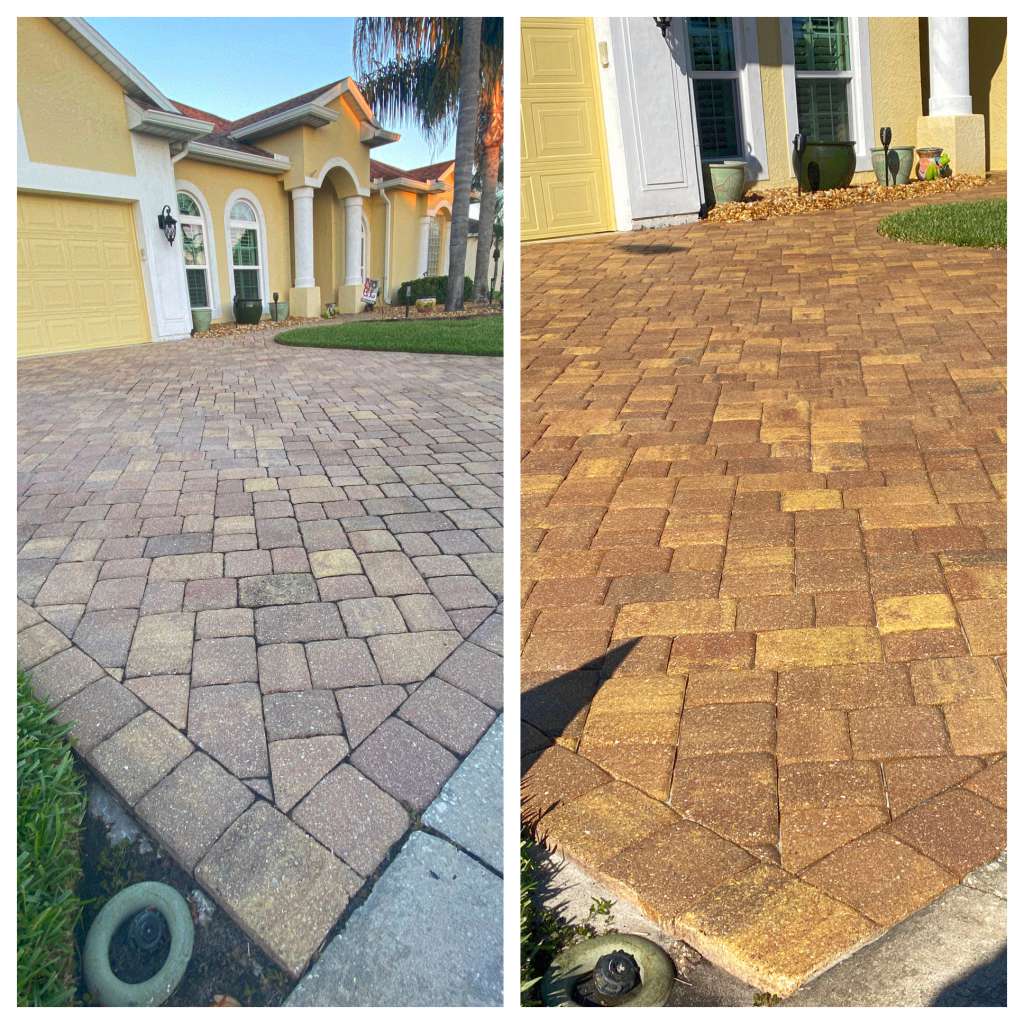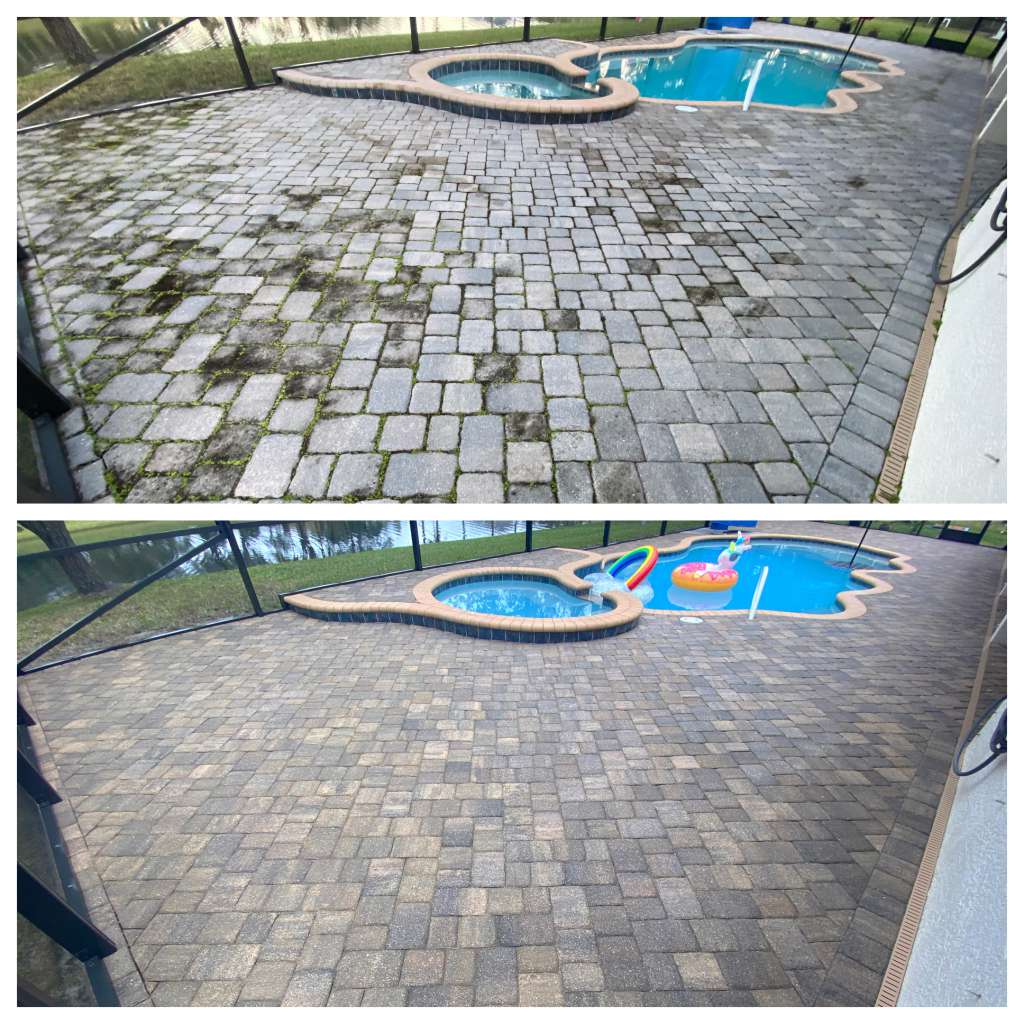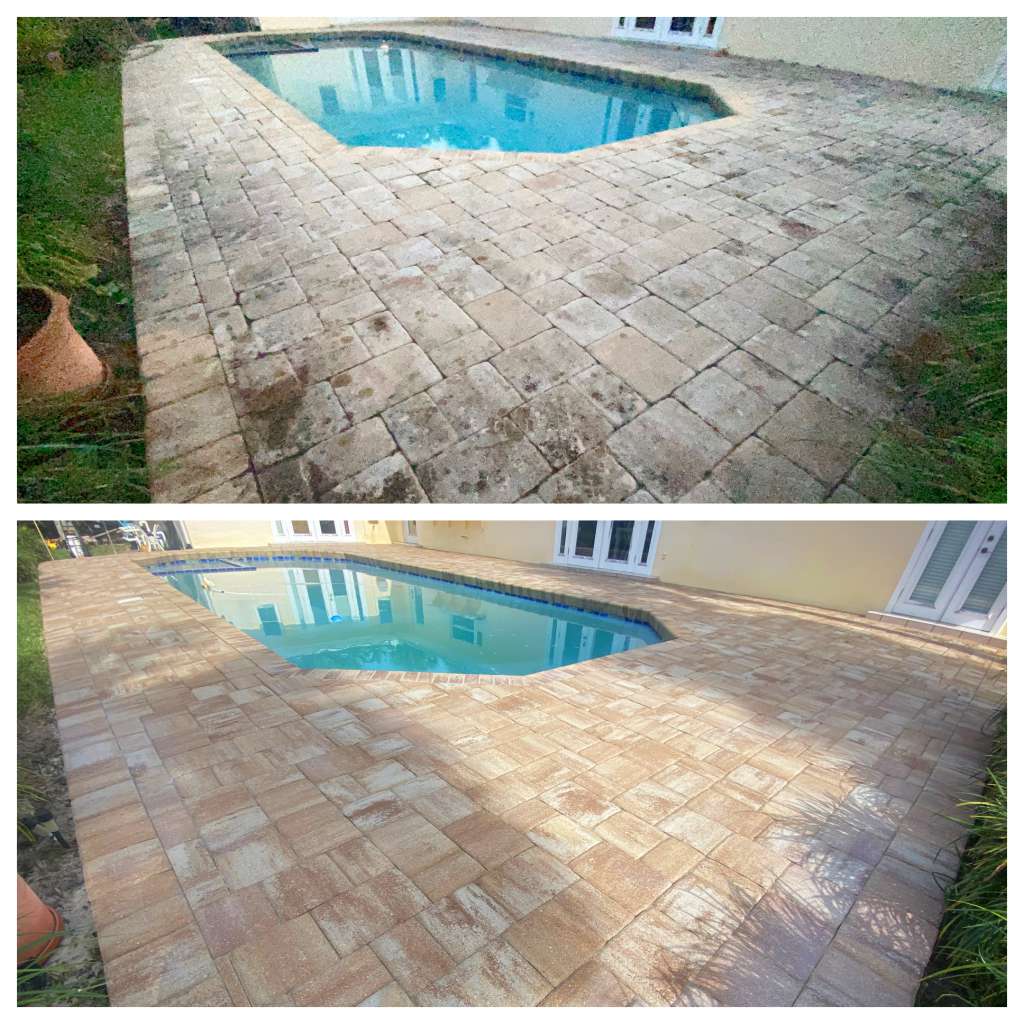[vc_row][vc_column css=”.vc_custom_1616254024951{padding-top: 30px !important;}”][vc_column_text css=”.vc_custom_1622771702017{padding-top: 30px !important;}”]
COCOA PAVER SEALING DONE RIGHT, THE FIRST TIME
Paver Sealing uses equipment specifically designed to quickly and evenly seal various surfaces. Even though they are fairly maintenance free, driveways and sidewalks can still become very dirty and discolored. They are also severely affected by salt and snow, acid rain, moisture and high temperatures. Professional paver sealing services can make dramatic improvements to the appearance of your driveway and sidewalk. With our unique paver sealers which penetrate your existing surfaces, you can protect it from the damaging elements and form a barrier that keeps even oil from penetrating. Simple Washing’s paver cleaning and sealing service is the answer to your surface needs.
STEP 1 – CLEANING
- Application of Algicide & Commercial-Grade Degreaser
- Pressure Washing Using Commercial-Grade Cleaner
- Deep Cleaning of Paver Joints
- Efflorescence Treatment
- Efflorescence Removal
- Thorough Cleaning Inspection of Pavers
STEP 2 – WET SANDING
- Application of Clean Anti-Algae Sand inside Joints
- Wet Sanding technique to ensure proper sanding compartment
- Inspection to Assure Proper Sand Height in Joints
- Final Sanding Inspection
STEP 3 – PAVER SEALING
- Sprayed Application of Premium Deep-Penetrating Flood Coat
- Inspection of Consistent Coat
- Application of Final Premium Coat
- Final Sealing Inspection & Approval
[/vc_column_text][/vc_column][/vc_row][vc_row][vc_column css=”.vc_custom_1616254024951{padding-top: 30px !important;}”][vc_column_text css=”.vc_custom_1622771720838{padding-top: 50px !important;padding-bottom: 50px !important;}”]
Our Paver Sealing Process In Cocoa Florida
[/vc_column_text][vc_video link=”https://www.youtube.com/watch?v=Wqv9RXXAzJs”][/vc_column][/vc_row][vc_row][vc_column css=”.vc_custom_1616254024951{padding-top: 30px !important;}”][vc_column_text css=”.vc_custom_1622771741858{padding-top: 30px !important;}”]
BENEFITS OF PAVER SEALING
- Inhibits weeds and grass in joints
- Reduces moss growth
- Deters ants and other insects
- Prevents loss of sand in joints
- Helps repel oil, grease, grime and stains from pavers
- Enhances color, texture and brightness
- Easier routine cleaning
- Resists the effects of Brevard Counties harsh weather conditions
- Provides protection from salt damage
- Reduces surface deterioration and wear
- Assures long lasting beauty and value
- Prevents pavers from shifting
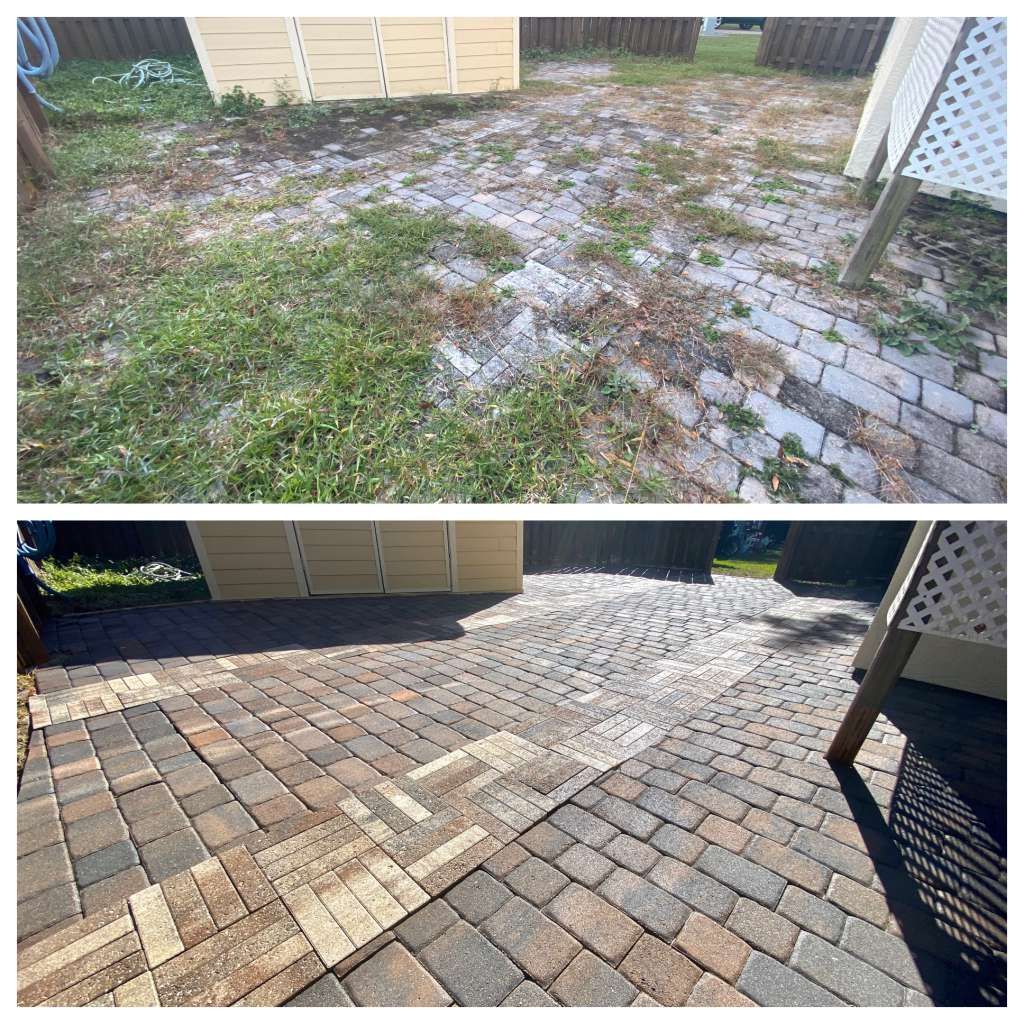
Why Choose Us For Your Cocoa Paver Sealing Needs?
- #1 Rated with over 230 5-star reviews on Google
- Google Guaranteed Certified
- Licensed – Insured – Bonded
- 100% Satisfaction Guarantee
- Environmentally Friendly
- All Work Comes With Our Warranty
- We Have NEVER Had A Unsatisfied Customer!
- Veteran & Family Owned
[/vc_column_text][/vc_column][/vc_row][vc_row][vc_column][vc_column_text css=”.vc_custom_1622747094089{padding-top: 50px !important;padding-bottom: 50px !important;}”]
LOOKING FOR PAVER SEALING SOMEWHERE ELSE?
[/vc_column_text][/vc_column][/vc_row][vc_row][vc_column width=”1/2″][vc_column_text]
- Palm Bay Paver Sealing
- West Melbourne Paver Sealing
- Melbourne Paver Sealing
- Viera Paver Sealing
- Rockledge Paver Sealing
- Cocoa Paver Sealing
- Merritt Island Paver Sealing
[/vc_column_text][/vc_column][vc_column width=”1/2″][vc_column_text]
- Malabar Paver Sealing
- Satellite Beach Paver Sealing
- Melbourne Beach Paver Sealing
- Indialantic Beach Paver Sealing
- Indian Harbor Beach Paver Sealing
- Valkaria Paver Sealing
- Grant Paver Sealing
[/vc_column_text][/vc_column][/vc_row][vc_row css=”.vc_custom_1622725917263{padding-top: 50px !important;}”][vc_column][vc_column_text]
Common Questions You May Have
Q: Why should I seal my pavers?
A: Pavers are sealed for protection, enhancement & ease of maintenance.
Q: My pavers were just installed. How long do I need to wait before I can seal them?
A: Generally 30-60 days after manufacturing, but it really depends on the type of pavers you have and the extent of efflorescence present in your pavers. Also follow the recommendation of the paver manufacturer.
Q: How long does the process of cleaning and sealing take?
A: Usually 1-3 days but it depends on the product used and conditions. However, with our Product cleaning and sealing may be done in one day!
Q: I have a white haze on my pavers and they have not been sealed. What can I do about this?
A: During our sealing process, our efflorescence remover is the appropriate product for this situation. Efflorescence is a white deposit sometimes left behind on top of the paver during the curing process.
Q: I have sprinkler rust on my pavers. How do you get this off?
A: We utilize a product that neutralizes the iron/rust and is a safe appropriate product for this stain.
Q: How can you tell if you need to reseal your pavers?
A: A simple way of telling if your pavers need resealing is to run water on the pavers. If the water is immediately absorbed it is time to reseal. Generally, it is recommended to wait a minimum of 18 months before resealing.
Q: How long do I have to wait to drive my car on the pavers after sealing?
A: It takes 48 hours for most sealers to fully cure.
Q: My car dripped oil on my pavers. Can you get it up?
A: Depending on how long it has been on the surface we can shadow it by using the appropriate product for this stain. When sealing the pavers this generally blends right in however when the pavers are first installed the leftovers are left with the homeowner. In cases where oil has been left to sit on the brick for long periods of time, replacing those bricks is the best solution.
Q: How often do I need to reseal my pavers?
A: We recommend a minimum of 18 months prior to resealing. Generally 2-3 years for driveways & pool decks depending on conditions and wear.
Q: I had my pavers sealed a few months ago, but now there’s a white cloudy film on the surface. Can this be fixed?
A: This condition is usually a result of improper application with either the sealer failing or a build-up of sealer on the surface. Generally the sealer needs to be restored by stripping it and starting over.
[/vc_column_text][/vc_column][/vc_row][vc_row][vc_column][vc_column_text css=”.vc_custom_1622725852726{padding-top: 50px !important;padding-bottom: 50px !important;}”]
OTHER WAYS WE SERVE YOU
[/vc_column_text][/vc_column][/vc_row][vc_row][vc_column width=”1/2″][vc_column_text]
[/vc_column_text][/vc_column][vc_column width=”1/2″][vc_column_text]
[/vc_column_text][/vc_column][/vc_row][vc_row css=”.vc_custom_1622725942332{padding-top: 50px !important;}”][vc_column width=”2/3″][vc_column_text]
Get A Free Estimate For Paver Sealing
[/vc_column_text][/vc_column][vc_column width=”1/3″][/vc_column][/vc_row]

